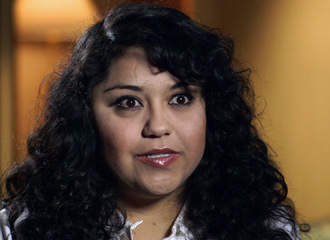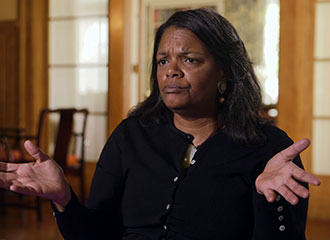How 4 Homeless Women Veterans Changed Their Lives
5-minute read
How 4 Homeless Women Veterans Changed Their Lives
5-minute read
The impact of trauma, anxiety, and PTSD can cause difficulty for women Veterans at home and at work, and sometimes lead to homelessness. Many Veterans face challenges — especially during their transition out of the military — that can impact every aspect of their lives.
These four women Veterans, who were once homeless, sought help for their physical and mental health issues — the first step to getting off the street and back into housing. They were better prepared to find practical solutions through transitional housing and financial assistance programs, setting them on a path to stability. These women share valuable advice on how to persevere and seek help.
From Skid Row to Standing on her Own
Lidia, a U.S. Navy Veteran, experienced traumatic events during her service, including the loss of a close friend in the USS Cole bombing. Lidia pushed her difficult memories aside, and moved to California after leaving the service. “A lot of the things that happened I never talked about,” she says.
Lidia lost her job in the food industry and then lost her apartment. Suddenly she didn’t know where she would sleep at night. In addition to the physical toll of homelessness, Lidia’s living situation affected her mental health as well. “It introduced me to depression,” she says.
“I still had the mentality of ‘I can overcome this,’” Lidia says. “If I can be on a ship with 5,000 people, and get out [of the service], and graduate from college, and get a great job, and then move to California, I can do anything. But I could not get out of skid row.”
Watch Lidia’s video to hear about her journey from the streets to getting back on her feet.
Starting From Scratch After Service
Starting from scratch — that’s how BriGette, who served in the U.S. Army from 1987–1991, describes transitioning from service. No family. No friends. No more structure like the military offered.
The effects of PTSD and traumatic brain injury hindered BriGette’s ability to work, and her young daughter was having health issues. “Things got bad quickly,” she says. After experiencing a few bouts of homelessness, she reached out for support.
“I found out about the HUD/VASH program through one of the social workers at the VA,” BriGette says. “They really worked with me to get some type of financial resources, get me the kind of care I needed for my daughter. They plugged me in to the information so we could get stabilized.”
Don’t Worry About Labels
“Give yourself a chance. Don’t worry about the labels.”
That’s Sandra’s advice to fellow women Veterans who may be experiencing homelessness. After her service in the U.S. Navy and National Guard, she had trouble finding her purpose and fell on hard times. “I was homeless,” she remembers. “I didn’t have a place to stay.”
She reached out to VA’s HUD/VASH program, which provided transitional housing and therapy. The resources Sandra accessed helped her get back on her feet, and now she encourages other Veterans to reach out. “Please, if you need help, do not hesitate,” she says.
Hear her story.
A Full Future Ahead
“My friends would let me stay on their couches or floors or in their abandoned houses. I had nowhere to go,” says Diane, a female Veteran who served in the U.S. Air Force.
Her husband was abusive, which led to Diane’s panic attacks and heavy drinking. She became homeless, sleeping from couch to couch, and was eventually taken to a VA hospital. It was there she received therapy that gave her a more optimistic view on life. “It’s not that the rest of my life is going to be bad,” she says. “It’s just in the past, this part of my life didn’t go exactly the way I wanted it to the whole future ahead.
Diane says the VA facility she frequents is sensitive to women’s issues. “Connecting with other people in this program was paramount in my recovery and the people around me . . . the women, the men, all of us together.”
Additional Resources for Homeless Women Veterans:
- National Call Center for Homeless Veterans. Free, confidential, and available 24/7. Connect with a trained staff member at 1-877-4AID-VET (1-877-424-3838).
- Homeless Veterans Chat. If you’re a Veteran in crisis or concerned about someone else, use this chat service to find free, confidential support.
- Women Veterans Call Center. All representatives at the call center are women, and many are Veterans. Give them a call at 1-855-VA-WOMEN (1-855-829-6636) or chat online to learn about the service.



